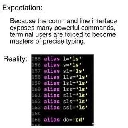Alias's rule
Alias's rule


Alias's rule


You're viewing a single thread.
Mint comes with dir aliased for ls, and the only other one I regularly use is cls for clear.
Yes I grew up on DOS, how can you tell?
Powershell does the opposite, having an alias from ls to whatever the powershell equivalent of dir is.
It gets better. PowerShell 5, which is still the default installation on Windows 11, aliases curl and wget to Invoke-WebRequest. The fucked-up part is that Win11 includes the real curl too, but the alias shadows it, and you have to use curl.exe. The even more fucked-up part is that Invoke-WebRequest still uses Internet Explorer to parse the result, and will panic if -UseBasicParsing is not passed every time, or IE isn't installed and initialized.
I used to develop applications in PowerShell. I still wear the mental scars.
The even more fucked-up part is that
Invoke-WebRequeststill uses Internet Explorer to parse the result, and will panic if-UseBasicParsingis not passed every time, or IE isn't installed and initialized.
That is absolutely horrifying.
And curl, and several others
I got used to all the other Linux commands, but I had to make an alias for md=mkdir. Why that already isn't a thing is beyond me.
I have a simple way of getting around that - I only make directories in the GUI.
People type clear instead of CTRL+L?
I've never had a terminal that that didn't work in. Or at the very least have a shortcut be able to be set for.
I often use clear when I need to rerun the same command and want to see the output in isolation each time, so I might run clear && ./build.sh and then just press the up arrow and run it again.
But I think, many people are also just not aware of the keyboard shortcut or don't care to remember it, since they don't use it often and clear is easy enough to guess.
I guess I'm the other kind of brain. I tap Ctrl+l on cooldown. But the up arrow thing makes sense. But still doesn't explain the alias if you're not actually typing it often.
CTRL+L and clear command do two different things (at least when using Bash on Debian):
CTRL+L scrolls the terminal output one screen so you don't see your previous output, unless you scroll up; clear does indeed clear terminal output completely, and your previous command history is available only through the history command. If you want CTRL+L to clear your screen completely you can add following to the .bashrc (or other file that is sourced when starting Bash, e.g. .bash_bindings):
bind -x '"\C-l":clear'
Note that it might not work if you use Vi mode inside Bash, but who does that.